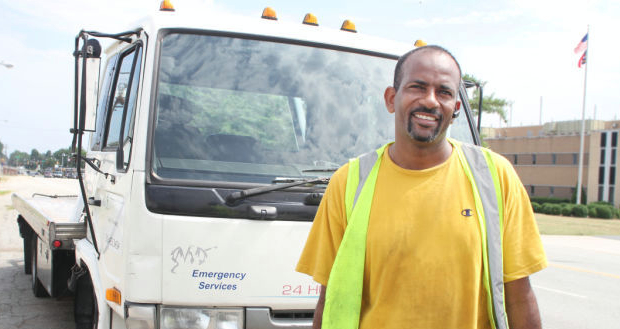Photo caption: Ibrahim Salih owns a towing service in Greensboro. Many of his clients are members of the refugee community.
Ahmed Mustafa Abdullah believes that unemployment among immigrants and refugees would decrease if they had easier access to small business loans.
Abdullah, who coordinates the Microenterprise for Refugees in the Triad, or MERIT program, for N.C. African Services Coalition, says refugees arrive with skills, and many were entrepreneurs in their native countries.
The MERIT grant from the the state Office of Refugee Resettlement, provides business training and technical assistance to refugee and asylum-seeking entrepreneurs who have been in the country five years or less. The program provides assistance in developing capital resources and establishing, or repairing, a credit history. It targets refugees with entrepreneurial skills who lack access to funding from the mainstream financial institutions because they lack a credit history. With these grants, recipients establish a credit record as they repay their loans.
To date, 10 Triad refugees have received loans for start-up or expansion costs, and 11 more will soon be disbursed. The average loan is about $4,500, with a three-year term. The entrepreneurs include butchers, tailors, grocers, tow truck operators and auto dealers. They also receive training, technical and networking assistance through the N.C. Entrepreneurship Center. Over the next four years, 134 loans will be awarded.
Million Mekonnen, executive director of N.C. African Services Coalition, favors eventually expanding the program to include short-term and large business loans, as well as making it available to low- and moderate-income applicants outside of the refugee community.
N.C. African Services Coalition and UNCG’s N.C. Entrepreneurship Center and Center for New North Carolinians are program partners. Maha Elobeid, of CNNC, says it’s difficult for immigrants and refugees to obtain sustainable jobs with living wages, even those professionals with academic or technical degrees from their native countries.
“Education and entrepreneurship become the only two ways out of the poverty cycle,” she says.
We spoke with two MERIT grant recipients. Here are their stories.
Asmerom Ghebremicael, El Hadj Auto Sales, 445 N. English St.
The sales staff at El Hadj Auto Sales don’t wear suits because there’s a good chance the same man who sells a car also helped fix it.
A nondescript rectangular building the color of silly putty serves as a garage, waiting room and break area for employees. The car lot — a row of parking spaces — in front of the building sits just off the road.
Asmerom Ghebremicael is one of four African entrepreneurs who operate their auto sales businesses under El Hadj. Most of their cars were purchased at a local auto auction. While each runs his business independently from the others, they aren’t competitors. They pool their resources by sharing the rent and tools. Each man may have up to seven cars at a time, so they can also offer more variety.
This is a dream come true for Ghebremicael, a soft-spoken, lanky 29-year-old refugee from Eritrea. He’s been a business owner for about 17 months, and maintains a monthly average of about four vehicles. His customers pay an average of $1,500 to $5,000 for a car.
He fled his homeland to escape mandatory, indefinite military service. The majority of able-bodied adult Eritreans are on “indefinite, compulsory” active military service or on reserve, according to Human Rights Watch. The organization reports that men are required to fulfill national service until their mid-50’s, and women until age 47, unless married.
Ghebremicael left his family in 2005 for a refugee camp in Sudan. He arrived in the U.S. about 18 months ago. Upon arriving in Greensboro, Ghebremicael worked at a chicken processing plant. But he didn’t feel it was his destiny.
He became acquainted with Jamal Eldin, who started El Hadj 12 years ago. Ghebremicael observed, then worked for him before beginning his own business.
“To do your own business is better,” Ghebremicael says. “When you work for someone else, you don’t grow.”
“He’s doing good. He knows a lot of people, and they trust him,” Eldin says.
Ibrahim Salih, Easy Towing
Salih parks his white tow truck at El Hadj.
Salih, 34, ran a cattle business in his native Sudan. But a 22-year conflict between North and South Sudan led to the deaths of two million people, and millions more fled the country. Salih left Sudan with his family — a wife and three sons — in 2008. They spent three years in a refugee camp in Egypt, before coming to the U.S. in 2012.
He sold handmade jewelry for awhile. But materials are expensive. He worked more than a year at Walmart, while dreaming of running his own business again. His friend, Eldin, recommended he start a towing business. There are a lot of cars in Greensboro, and it’s a necessary service. An African entrepreneur wanted to return home, so Salih bought his tow truck, along with a list of all of his contacts and clients.
Most of Salih’s customers are refugees and immigrants who can’t afford new cars. Their cars regularly break down, Salih says. He also frequently tows cars from the auto auction for El Hajd.
Salih, who wears a bluetooth clipped around one ear and a highway safety vest, prefers being an entrepreneur for the freedom and opportunities it provides: “You will get new customers, new friends.”
It’s also more profitable, he says.
Reposted from the News & Record
By Tina Firesheets Special to the News & Record
Photo credit: Nancy Sidelinger/Special Sections
